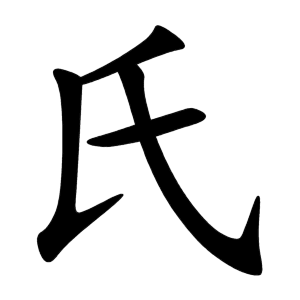氏
- lineage;
- surname;
- clan;
It generally refers to a family lineage or ancestral name.
Etymology
The Shuowen Jiezi (説文解字 shuōwén jiězì) explains, based on the Small Seal Script (小篆), that the character represents a cliff in the mountains of Bazhong (now Sichuan Province) from which rocks look as if they might soon fall—an iconic pictogram. However, the oracle bone script (甲骨文, jiǎgǔwén) form is different, and because the character is simplified and used phonetically for other meanings, its original meaning is difficult to determine.
Some interpret the character as depicting a person bowing their head with arms lowered to touch the ground, thus considering it the original form of 氐 (meaning "to bow down"). By phonetic loan (가차), the character added the horizontal stroke 一, which denotes the earth, forming 氐. This character then came to mean "root," "basis," or "generally," and later 低 (meaning "low") came into use.
On another note, it is also interpreted as symbolizing tree roots underground or a clan’s totem staff, connecting the meaning to clans or tribes.
The character originally derived from the concept of a single blood-related clan (姓), but as groups dispersed to various regions, it came to signify groups bound by regional ties. To distinguish this from the clan name (姓), a respectful suffix "~shi" (씨) was added after the group’s role name. Over time, this suffix expanded in use to be added after the surnames or names of married women’s fathers or husbands, and even further, it came to be attached after the names of famous individuals (usually those with a scholarly school or lineage), progressively broadening its meaning.
In ancient times, queens or wives of nobles were referred to with the suffix "~shi," but unlike modern usage, "shi" then meant "the wife of ~ clan (née ~)," and the Korean native word for bride "gaksi (각시)" originated from this usage. In ancient Japan, this character referred to the clan names (uji) bestowed by the emperor.
However, from the Heian period onward, uji was gradually supplanted by myoji (苗字), surnames based on place of origin, and became rare in everyday use except in official or diplomatic documents. After the Meiji Restoration, the character 氏 came to be identified almost exclusively with myoji. Unlike uji, which were granted by the emperor and could not be arbitrarily changed, myoji could be changed relatively easily by individuals, allowing the state to issue many new myoji to commoners during the Meiji era.
The infamous Japanese colonial policy of "changsi gaemyeong" (창씨개명), which forced Koreans to change their surnames, was an effort to replace the Korean family system based on 성 (姓) with the Japanese-style family registry system based on 씨 (氏, myoji).
Usage in Korean
In modern Korea and Japan, the usage of this suffix has further expanded and continues to be used as a respectful honorific suffix appended to surnames or personal names. The original meaning of "wife of the clan ~" has disappeared, and now it is used as a neutral honorific regardless of gender. However, the frequency of "ssi" (씨) used in daily Korean speech is much higher than in Japanese, where it is mostly limited to formal, written contexts such as news reporting, court proceedings, or medical consultations.
In contemporary Korean, "ssi" is used as a polite form of address between people with a certain social distance, such as in professional or formal relationships. However, excessive use of "ssi," even in some private or semi-formal contexts, can sound harsh or overly formal. Especially when attached directly to surnames (e.g., Kim-ssi, Lee-ssi, Park-ssi), it may sometimes come off as slightly derogatory or distancing.
The term "ssi" (씨) is also widely used as a personal suffix to refer to rank-and-file employees who have not yet been assigned a formal rank (such as "manager" or "assistant manager"). Calling someone "ssi" despite their official rank can be considered a serious breach of business etiquette, so care is needed.
Due to its frequent use in Korean and the rarity of hanja starting with the consonant ᄊ, some Korean speakers mistakenly associate "ssi" with native Korean words like "ssiat" (씨앗, meaning "seed"), but this is an error. The word "ssi (氏)" has clear roots in Chinese characters.
In Vietnamese, it is read as "thị," and it often follows the family name of women, as in the name Phan Thị Kim Phúc (潘氏金福). Originally, it was used like "Miss" in English, referring to unmarried women, but in modern times it has expanded to refer to all women. However, simply saying "thị" alone could historically be used derogatorily for women. Today, it is often omitted in casual use, and in translations within the shared Han-character cultural sphere, it is frequently left out.
Characters with 氏
Words that derived from 氏
- 竹女心 (HVP)
- ⿸⿱ 丿 𠄌 𫠠
